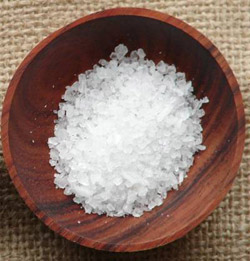 Why do so many recipes call for kosher salt? In what way does it make a difference? Kosher salt got its name from its use by Jewish butchers to draw blood from meat, one of the requirements of kashrut, the Jewish dietary laws.
Why do so many recipes call for kosher salt? In what way does it make a difference? Kosher salt got its name from its use by Jewish butchers to draw blood from meat, one of the requirements of kashrut, the Jewish dietary laws. Because of the flaky, crystalline structure of the kosher salt, it sticks much better to meat and is able to draw out more moisture, including blood.
And since kosher salt is much less salty, more can be sprinkled for this purpose without making the meat taste overly salted.
Another major advantage of kosher salt is that unlike much of the regular table salt, it has no iodine added. A 1920s law required salt manufacturers to add a small amount of iodine to table salts, as a preventive measure against goiter, especially in the Midwest, where the ground water lacks iodine.
The added iodine, however, can impart an off taste and color to some delicate recipes, especially in canning, where most recipes require the use of non-iodized salt.
Chefs and recipe writers also like the delicate structure and purity of the kosher salt, which are similar to sea salt, their first choice. Sea salts, however, are far more expensive, not worth the cost for workaday recipes.
Here is one thing to remember if you are substituting kosher salt for the regular salt called for in a recipe: You will need 1-1/2 tablespoons of Morton's kosher salt, or 2 tablespoons of Diamond Crystal kosher salt to replace 1 tablespoon regular. This is according to Shirley Corriher in her informative book CookWise, available in the county public library system.
Here she has a very apt analogy for the two kinds of salt: If regular salt crystals are like ice cubes, the kosher crystals are like the snow.